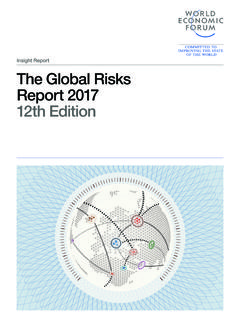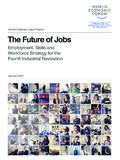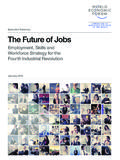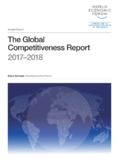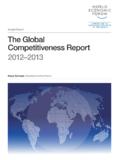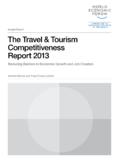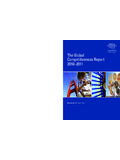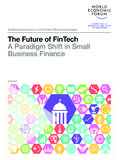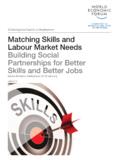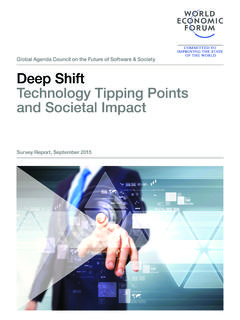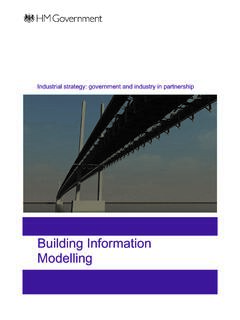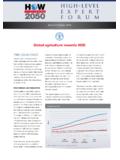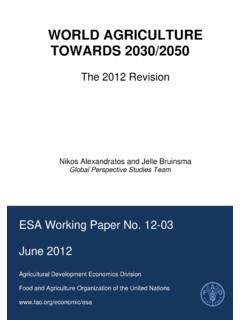Transcription of Industry Agenda The New Plastics ... - World Economic Forum
1 Industry AgendaThe New Plastics Economy Rethinking the future of Plastics January 2016 World Economic Forum , 2016 All rights part of this publication may be reproduced ortransmitted in any form or by any means, includingphotocopying and recording, or by any informationstorage and retrieval 0801163 The New Plastics Economy: Rethinking the future of Plastics Contents3 Preface4 Foreword5 In Support of the New Plastics Economy5 Project MainStream5 Disclaimer6 Executive Summary10 1 The Case for Rethinking Plastics , Starting with Packaging10 Plastics and Plastic Packaging Are an Integral and Important Part of the Global Economy12 Today s Plastics Economy Has Important Drawbacks16 2 The New Plastics Economy: Capturing the Opportunity16 The New Plastics Economy Proposes a New Way of Thinking 20 The New Plastics Economy Could Bring Substantial Benefits21 Now Is an Opportune Moment to Act22 Where to Start23 3 The New Plastics Economy Demands a New Approach28 For further information28 List of Figures28 Endnotes31 AcknowledgementsThe circular economy is gaining growing attention as a potential way for our society to increase prosperity, while reducing demands on finite raw materials and minimizing negative externalities.
2 Such a transition requires a systemic approach, which entails moving beyond incremental improvements to the existing model as well as developing new collaboration report explores the intersection of these two themes, for Plastics and plastic packaging in particular: how can collaboration along the extended global plastic packaging production and after-use value chain, as well as with governments and NGOs, achieve systemic change to overcome stalemates in today s Plastics economy in order to move to a more circular model? The New Plastics Economy aims to set an initial direction and contribute to the evidence base by synthesizing information from across many dispersed sources. It assesses the benefits and drawbacks of plastic packaging today, and makes the case for rethinking the current Plastics economy.
3 It lays out the ambitions and benefits of the New Plastics Economy a system aiming to achieve drastically better Economic and environmental outcomes. It proposes a new approach and action plan to get there. The report s objective is not to provide final answers or recommendations. Rather, it aims to bring together for the first time a comprehensive global perspective of the broader plastic packaging economy, present a vision and propose a roadmap as well as a vehicle for progressing this roadmap, and providing a much-needed global focal point to carry this Agenda forward. This report also identifies a number of significant knowledge gaps and open questions that need to be further explored. This report is the product of Project MainStream, an initiative that leverages the convening power of the World Economic Forum , the circular economy innovation capabilities of the Ellen MacArthur Foundation, and the analytical capabilities of McKinsey & Company.
4 We are grateful to our numerous partners and advisors for their insights and support throughout this project, and the Project MainStream Steering Board for their continued collaboration on the transition towards a circular economy. For the three institutions that have launched the MainStream initiative, this report is an encouragement to continue to foster cross- Industry collaboration as a major avenue to accelerate the transition to the much-needed circular economy. We hope you find this report informative and useful. We invite you to engage with us on this timely Ellen MacArthurFounder Ellen MacArthur FoundationDominic WaughrayHead of Public Private Partnership World Economic ForumMartin R. Stuchtey Director of the McKinsey Center for Business and EnvironmentPreface4 The New Plastics Economy: Rethinking the future of Plastics We live in a defining moment in history a moment where the international community has come together to agree on an ambitious framework to resolve some of the World s most daunting in a set of universally applicable Sustainable Development Goals, the 2030 Agenda for Sustainable Development, adopted by all 193 members of the United Nations in September 2015, underlined a common determination to take bold and transformative steps towards a better future for all.
5 Now is the time for implementation. We must now begin to practice what we have preached changing our production and consumption patterns in order to create virtuous cycles rather than depletive ones and harnessing the global interconnectedness, communications technology and breakthroughs in materials sectors of the economy must respond to these global agreements, and due to their sheer pervasiveness and scale, some sectors are facing questions as to the direction they should take. This is particularly the case for Plastics , which have tangible and substantial benefits, but whose drawbacks are significant, long-term and too obvious to ignore. It is therefore encouraging to see an initiative like the New Plastics Economy take shape, supported by a diverse group of participants from the Industry striving for innovative solutions grounded in systems thinking.
6 Concrete and game-changing steps have to be taken for us to achieve the future we want anchored in the SDGs. I therefore welcome wholeheartedly the bold ideas, ambitious objectives and comprehensive action plan presented in this report. If implemented, it could make an important contribution to transforming this important sector of the global economy. Mogens LykketoftPresident of the UN General Assembly for the 70th sessionForeword5 The New Plastics Economy: Rethinking the future of Plastics In Support of the New Plastics Economy As the Consumer Goods Forum , we welcome this groundbreaking report on the New Plastics Economy. Packaging is integral to the delivery of safe, high-quality consumer products, but we recognise the need to rethink radically how we use Plastics , creating new circular systems that conserve resources, reduce pollution and promote efficiency.
7 This report improves substantially our understanding of the solutions we need. Mike Barry and Jeff Seabright, co-chairs of the Consumer Goods Forum Sustainability Pillar The Global Ocean Commission has been working with the Prince of Wales International Sustainability Unit to raise political and business awareness of the urgent need to address plastic waste entering the ocean, and transition to a more circular model for Plastics . I am very pleased to see that the Ellen MacArthur Foundation and its partners have responded to this call to action, through the New Plastics Economy report, and have developed an ambitious yet realistic plan to address the issue at its root. I strongly encourage nations and business leaders to consider the contents of this report and develop corresponding strategies.
8 David Miliband, Co-chair, Global Ocean Commission It is high time to implement the circular economy principles in the plastic sector. Increasing plastic recycling would capture significant material value and help reduce greenhouse gas emissions. As pointed out in this report, plastic production has increased from 15 million tonnes in the sixties to 311 million tonnes in 2014 and is expected to triple by 2050, when it would account for 20% of global annual oil consumption. These are exactly the reasons why Veolia, which is already actively engaged in promoting circular solutions, welcomes and supports the New Plastics Economy. Antoine Fr rot, CEO, Veolia The New Plastics Economy takes a detailed look into one of the World s most pervasive modern materials.
9 The report lays out a foun-dation for a more sustainable system of making and using Plastics and plastic packaging, taking into account the unique challenges and opportunities on the use, re-use, and collection of the material. It is a call to action for an ambitious redesign with a longer term view of the value at stake and intensive collaboration among various players. Dominic Barton, Global Managing Director, McKinsey & Company London is already actively taking steps towards a more circular model for Plastics and plastic packaging. However more can and needs to be done, and I therefore welcome, support and thank the Ellen MacArthur Foundation, the World Economic Forum and McKinsey for their effort in identifying and promoting the global innovations required if we are going to continue to enjoy the benefits that Plastics bring to our lives.
10 Matthew Pencharz, Deputy Mayor for Environment and energy , Greater London Authority The New Plastics Economy is an exciting opportunity to inspire a generation of designers to profoundly rethink plastic packaging and its role in a system that works. Tim Brown, CEO, IDEO In the Global Ocean Commission s report From Decline to Recov-ery: A Rescue Package for the Global Ocean , we identified keeping Plastics out of the ocean as one of our key proposals for action to advance ocean recovery. This report is an excellent next step, offer-ing a root-cause solution to the problem of ocean Plastics as part of a broader rethink and new approach to capture value in the New Plastics Economy. The Economic and environmental case is now clear - I therefore call on governments and businesses alike to take urgent action to capture the opportunity.
